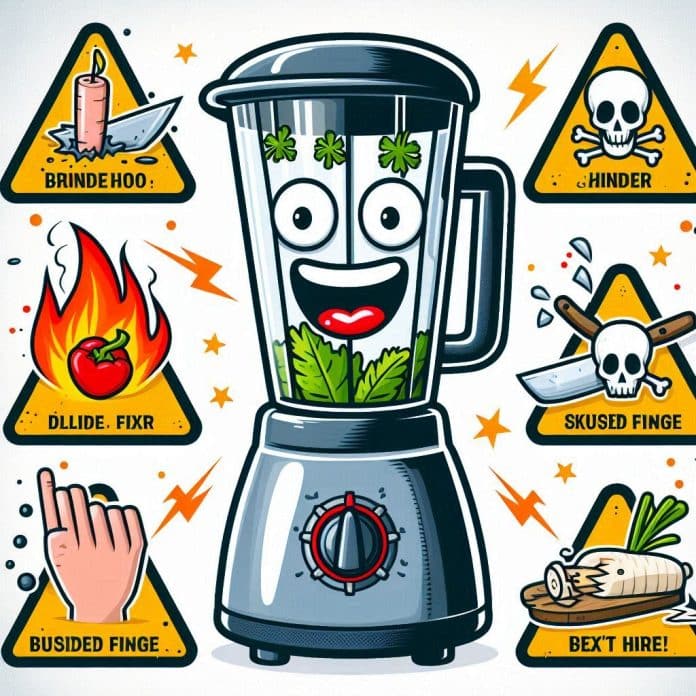Blenders are a staple in many kitchens, praised for their ability to whip up smoothies, soups, and sauces in seconds. However, their convenience can come with risks if not used properly. From sudden malfunctions to unexpected injuries, the hazards of using vegetable blenders are worth paying attention to.
Common Hazards of Using Vegetable Blenders
Blenders, especially those used for chopping and pureeing vegetables, can pose several risks. Mechanical issues, such as blade malfunctions, can lead to severe cuts, while electrical faults might cause shocks or fires. It’s crucial to be aware of these risks to use your blender safely.
Mechanical Failures:
Blenders rely heavily on their mechanical parts. Over time, blades can become dull or break, potentially leading to dangerous malfunctions. Regular checks and maintenance are key to preventing these issues.
Electrical Malfunctions:
Like any electrical appliance, blenders pose a risk of electrical shock or fire, particularly if they are improperly wired or damaged. Always check the integrity of your blender’s electrical components before use.
Cuts and Lacerations
Perhaps the most common injuries from blenders are cuts and lacerations. These often occur during cleaning or if the blender starts unexpectedly. Always unplug the blender before attempting any maintenance.
Detailed Case Studies of Blender Accidents
To underscore the importance of blender safety, let’s examine a few case studies where things went wrong. These real-life incidents provide clear insights into the potential dangers and how they can be avoided.
Case Study 1:
A user suffered severe hand injuries after trying to dislodge food from a blender while it was still powered. This incident highlights the need for a safety-first approach when handling blenders.
Case Study 2:
In another instance, a blender’s motor malfunctioned, causing it to catch fire. Regular maintenance could have identified the failing components before they led to a fire.
Essential Safety Tips for Using Vegetable Blenders
Ensuring your safety when using a vegetable blender is paramount. Here are some crucial tips to help you avoid accidents and maintain your blender in good condition.
Read the Manual:
Before you start using your blender, make sure you read the manufacturer’s manual. It contains specific safety instructions for your model.
Inspect Before Use:
Always inspect your blender for any signs of wear or damage before use. Check the cord, plug, blades, and the container. If anything looks questionable, do not use the blender until it’s repaired or replaced.
Use Properly:
Never put your hands or utensils inside the blender while it is plugged in. Always use the tamper or other accessories provided by the manufacturer to push food towards the blades.
Keep It Clean:
Ensure your blender is clean before and after every use. Build-up of food can cause bacteria growth and potentially degrade the components of the blender, which could lead to malfunctions.
Also Check: Sean Patterson Obituary
Choosing the Right Blender for Safety
Selecting a blender that prioritizes safety features is as important as using it safely. Here’s what to look for when purchasing a new blender:
Blade Quality:
Opt for blenders with high-quality, stainless steel blades that are durable and less likely to break.
Safety Locks:
Some blenders come with safety locks that ensure the blender only operates when the lid is securely in place.
Overload Protection:
This feature helps prevent the motor from overheating, reducing the risk of electrical issues.
Sturdy Base:
A blender with a sturdy base will not easily tip over, making it safer to use, especially at high speeds.
Legal and Manufacturer Guidelines on Blender Safety
Following legal and manufacturer guidelines can further enhance your safety. Here’s a summary of what to keep in mind:
Compliance with Standards:
Ensure that any blender you purchase complies with national safety standards. These regulations are designed to ensure the safety and efficacy of electrical appliances.
Warranties and Support:
Choose brands that offer good customer support and warranties. This ensures that you can get help quickly if something goes wrong with your blender.
Regular Updates:
Stay updated with any recalls or safety notices issued by the manufacturer or consumer safety agencies.
Conclusion
Using a vegetable blender can make meal prep easier and more efficient, but it’s important to be aware of the potential hazards that come with these devices. By understanding the common risks, adhering to safety guidelines, and choosing the right equipment, you can enjoy the benefits of your blender without compromising on safety.
FAQs about Vegetable Blenders
If your blender starts behaving unexpectedly or shows signs of malfunction, immediately unplug it and refrain from further use. Consult the user manual for troubleshooting tips or contact customer service for your blender’s brand. If necessary, take it to a professional for repair or replacement.
Regular maintenance, such as cleaning and inspecting the blades and motor, should be done after every use. As for replacement, it depends on the usage and quality of the blender. Typically, with daily use, consider replacing your blender every 3-5 years, or if you notice a decline in performance.
For those concerned about safety, consider opting for blenders with enhanced safety features such as automatic shutoff, blade guards, or models that operate only when the lid is securely attached. Handheld or immersion blenders can also be safer alternatives as they offer more control and typically come with fewer risks of injury.


